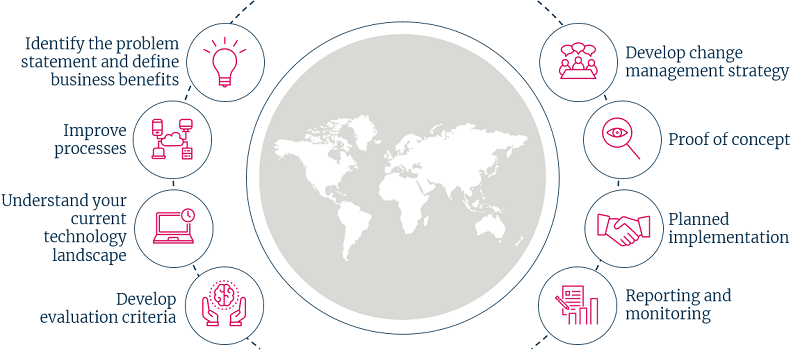In an era of rapid technological development, legal departments increasingly turn to innovative solutions to streamline operations and enhance strategic value. In this insight we explore how legal teams can leverage technology and AI to build effective strategies and implement processes that drive efficiencies to allow them to meet increasing demands.
Building a robust legal department strategy
A well-crafted strategy is key for any legal department aiming to deliver value and drive innovation. For it to be successful, an organisation needs to address several key areas to ensure comprehensive and effective implementation:
Align with corporate objectives
Ensuring alignment with the wider organisation ensures that the legal department can better support the achievement of the long-term vision and objectives. This alignment also ensures legal activities are integrated with the broader organisational strategy, leading to more effective risk management, compliance and overall business success.
Set clear functional targets
Translate corporate objectives into specific, actionable goals for legal teams; these should be specific and measurable and provide a clear direction for the efforts of legal departments.
Establish measurable goals and timelines
Measurable goals and timelines provide a clear framework for tracking progress and holding individuals and teams accountable for meeting targets.
Implement review mechanisms
Establishing a cadence for reviewing progress is crucial to track progress and allows for regular assessment and adjustments to ensure goals are met efficiently and effectively.
Develop an execution plan
An execution plan detailing the critical actions needed to deliver each objective helps to track progress and ensure legal departments remain aligned with the wider organisation's goals.
Cross-functional connectivity
Consideration should be given to how the legal department interacts with and supports other functions, fostering collaboration, promoting effective risk management and ensuring that legal activities are integrated with the broader organisational strategy.
Harnessing the power of technology
The legal tech marketplace offers a wide range of solutions ranging from GenAI, legal spend management, contract lifecycle management, e-discovery, enterprise software, IP management, matter management, document automation, contract analysis, workflow automation, compliance tools and data rooms designed to address various aspects of legal operations. However, the market is incredibly crowded, with many solutions and providers vying for attention and market share.
Selecting the right tools may seem straightforward but implementing them effectively requires a strategic approach. When executed effectively, legal tech offers innovative solutions to streamline operations in several key areas:
- Horizon scanning: machine learning and AI-based services proactively monitor regulatory changes, keeping legal teams ahead of compliance requirements.
- Contract lifecycle management: tools that provide immediate ROI by accelerating the speed of contract processing, directly impacting business operations and reducing bottlenecks.
- Legal research: GenAI is transforming the process by conducting initial research and preparing first drafts of memos, significantly reducing the time lawyers spend on these tasks.
- Invoicing and billing: automated processes combined with AI ensure bills comply with specific invoicing guidelines, improving accuracy and reducing disputes.
Leveraging technology can empower legal departments to operate more efficiently and proactively, ultimately adding value to the organisation as a whole. Embracing technological advancements allows greater focus on high-value strategic work while automating time-consuming manual processes, driving efficiencies, reducing cost, and contributing to higher revenues.
Getting it right with technology

To optimise the use of technology, legal departments need to implement strategic steps such as assessing their current technology infrastructure, identifying specific pain points and aligning technology solutions with their operational needs and long-term goals.
Integrating technology into operations
Technology can impact operations across multiple touchpoints by providing a secure, cloud-based solution that automates repetitive tasks, speeds up contracting, enables scalable and sustainable operations, and facilitates data-driven decisions.
For intake and triage, technology can open opportunities to create dynamic forms with rules for efficient request handling and document generation can be enhanced by automating drafting processes using customisable templates. In addition, AI can aid negotiations by redlining based on established playbooks, delivering efficiencies through streamlining the review process.
Furthermore, automated workflows can streamline notifications and approvals, and a customised clause library ensures consistency across contracts, reducing potential discrepancies and improving overall efficiency. E-signature processes can be automated to expedite contract finalisation and, finally, creating a centralised, searchable database of executed contracts provides valuable data insights for future decision-making and process improvements.
From a broader perspective, legal tech has the potential to rationalise the volume of work assigned to legal teams and lessen the administrative burden placed upon them, freeing up more productive time and consequently reducing the costs related to external support. It is crucial to have a robust change management system embedded into the organisation and suitable training to ensure the maximum adoption and effectiveness of new technology.
Optimising performance
Leveraging technology can significantly enhance legal team performance, using tech solutions effectively can streamline workflows, boost efficiency and sharpen decision-making in legal departments.
By adopting technology to implement real-time dashboards and analytics, legal teams can showcase their impact through data-driven insights and offer transparency into operations to facilitate informed decision-making. These tools also support improved compliance and risk management by identifying early indicators of potential issues through comprehensive data analysis.
Technology facilitates continuous improvement by gathering data from various sources to identify trends and drive process enhancements. Additionally, KPIs can be easily tracked and measured against SLAs, helping to showcase the legal team's efficiency and value with a comprehensive audit trail, bringing increased transparency and accountability.
DWF's Legal Operations, Technology and Consulting services offer cutting-edge expertise to transform in-house legal teams, integrating advanced technology solutions and optimising processes to maximise their value and efficiency. Combining deep legal knowledge with innovative tech implementation, DWF empowers legal departments to meet the unique challenges faced by modern organisations and drive measurable business impact.












